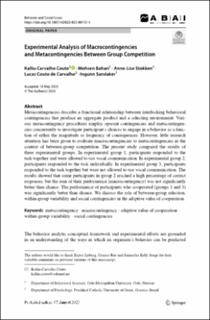Experimental Analysis of Macrocontingenciesand Metacontingencies Between Group Competition
Couto, Kalliu Carvalho; Bahari, Mohsen; Stokken, Anne‑Lise; Carvalho, Lucas Couto De; Sandaker, Ingunn
Peer reviewed, Journal article
Published version
Permanent lenke
https://hdl.handle.net/11250/3083121Utgivelsesdato
2023Metadata
Vis full innførselSamlinger
Originalversjon
http://dx.doi.org/10.1007/s42822-023-00135-4Sammendrag
Metacontingencies describe a functional relationship between interlocking behavioral contingencies that produce an aggregate product and a selecting environment. Various metacontingency procedures employ operant contingencies and metacontingen-cies concurrently to investigate participant's choices to engage in a behavior as a function of either the magnitude or frequency of consequences. However, little research attention has been given to evaluate macrocontingencies to metacontingencies in the context of between-group competition. The present study compared the results of three experimental groups. In experimental group 1, participants responded to the task together and were allowed to use vocal communication. In experimental group 2, participants responded to the task individually. In experimental group 3, participants responded to the task together but were not allowed to use vocal communication. The results showed that some participants in group 2 reached a high percentage of correct responses, but the sum of their performance (macrocontingency) was not significantly better than chance. The performance of participants who cooperated (groups 1 and 3) was significantly better than chance. We discuss the role of between-group selection, within-group variability and social contingencies in the adaptive value of cooperation. Keywords metacontingency · macrocontingency · adaptive value of cooperation · within-group variability · social contingencies The behavior analytic conceptual framework and experimental efforts are grounded in an understanding of the ways in which an organism's behavior can be predicted

